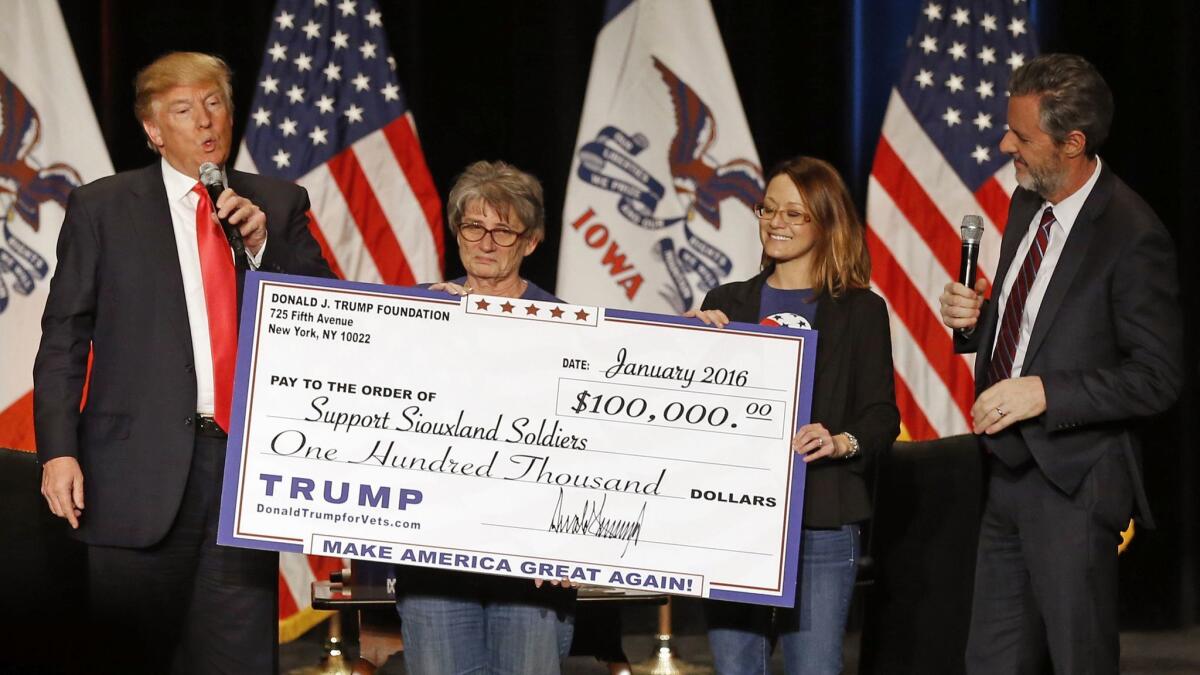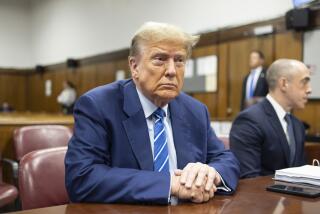New York charges Trump, his family and its foundation with ‘persistent’ violations
Reporting from New York — The New York attorney general filed a lawsuit against President Trump on Thursday, charging that he misused his charitable foundation for personal and political gains over more than a decade.
In the scathing complaint filed in New York State Supreme Court, the attorney general used adjectives such as “illegal,’’ “persistent” and “willful” to characterize the violations of the Donald J. Trump Foundation.
The president “used charitable assets to pay off the legal obligations of entities he controlled to promote Trump hotels, to purchase personal items and to support his presidential election campaign,’’ the lawsuit charged.
The attorney general, Barbara D. Underwood, is seeking $2.8 million in restitution from the Trump Foundation and to bar Trump for 10 years from serving as a director, trustee or officer of a nonprofit. The suit says that $1 million in remaining funds should be distributed to other charities.
Headquartered out of Trump Tower, the foundation was set up in 1987 as a nonprofit to raise money for charity. Trump himself has donated very little to the foundation since 2008, although he reimbursed some of the foundation’s donations after the attorney general began investigating.
The 41-page lawsuit hinted at the possibility of criminal charges in the future.
“Mr. Trump’s wrongful use of the Foundation to benefit his campaign was willful and knowing. Mr. Trump was aware of the prohibition on political activities and the requirement of restrictions on related party transactions. Among other things, he repeatedly signed, under penalties of perjury, IRS Forms 990 in which he attested that the Foundation did not engage in transactions with interested parties, and that the Foundation did not carry out political activity,’’ the lawsuit stated.
The foundation violated those pledges, the suit alleges.
And although the money was indeed donated to charities, the donations were often made in order to settle lawsuits, advance Trump’s businesses or to generate publicity for Trump’s presidential campaign.
Among the many examples cited in the lawsuit:
- Trump used $158,000 to settle a lawsuit against his Mar-a-Lago golf club in Florida by an angry golfer who claimed he was owed money for hitting a hole-in-one during a tournament. (Under the terms of the settlement, the money went to a foundation that had been set up by the golfer, Martin Greenberg.)
- The same device was used in 2007 to settle a dispute between Mar-a-Lago and the town of Palm Beach over building permits and flagpole heights. In the settlement, the Trump Foundation agreed to donate $100,000 to a charity of Palm Beach’s choosing, which was an organization to help veterans.
- An additional $10,000 went to buy a 4-foot-tall painting of Trump from a children’s charity; it had been hung in the interior of a golf club in Miami, but has since been returned to the foundation.
- The foundation donated $25,000 in 2013 to an organization seeking the reelection of Florida’s Republican attorney general, Pam Bondi. At the time, Bondi was considering joining a lawsuit against Trump for allegedly defrauding students at his now-defunct Trump University. After the donation was made, she decided not to participate in the suit.
It was during the presidential campaign in 2016 that the Trump Foundation became an invaluable political tool, used to boost Trump’s image at campaign rallies, where he was portrayed as a benevolent philanthropist.

Over and over at rallies in Iowa in the run-up to the caucuses there, Trump carried onto the stage enlarged mock-ups of checks that his foundation had purportedly written to local charities. The checks even had Trump’s campaign slogan (“Make America Great Again”) written along the bottom. Corey Lewandowski, Trump’s campaign manager, directed which charities would receive the money.
“When I raise money for the veterans, and it’s a massive amount of money, find out how much money Hillary Clinton’s given to the veterans,’’ Trump boasted after a 2016 Iowa fundraiser that had been organized by his campaign.
The lawsuit against the Donald J. Trump Foundation also named three of his adult children, Donald, Ivanka and Eric, as defendants, although their alleged offenses were of omission, not commission. All three served as board members, although the lawsuit contends that the foundation hadn’t held a board meeting since 1999.
“In the absence of a functioning board, Mr. Trump ran the Foundation according to his whim, rather than the law,” the lawsuit states.
Many of the allegations were first reported by the Washington Post.
The lawsuit makes clear that Underwood, a former Yale law school professor and career civil servant, will carry through with the investigations begun by Eric Schneiderman, who resigned as attorney general last month amid allegations that he was physically abusive to women.
Trump has complained that Schneiderman, who was on a “leadership council” of prominent New York Democrats during the Clinton campaign, was carrying out a political vendetta.
The president responded to the lawsuit Thursday with a series of tweets.
San Diego State University professor Seth Kaplowitz, who teaches law in the university’s business college, called the complaint “quite serious” and possibly a precursor to criminal charges once Trump leaves office.
“It’s basically fraud, and fraud with a charitable organization,” said Kaplowitz.
“Any time you are charged with fraud and illegal activities, it is serious,” he said. “This could mean jail time” for a person convicted criminally of the offenses.
He said a sitting president can’t be indicted, but Trump could face criminal charges once he leaves offices.
“This basically accuses the president of using the foundation as a personal checkbook,” Kaplowitz said.
The New York lawsuit opens a powerful new front in the legal onslaught against the president as special counsel Robert S. Mueller III continues his investigation into the ties of Trump associates with Russia. Trump has hinted that he could use his presidential power to pardon associates of federal crimes, but charges brought in New York state would not be subject to pardon power.
Tmes staff writer Maura Dolan in San Francisco contributed to this article.
UPDATES:
5:10 p.m.: This article has been updated throughout with staff reporting.
10:55 a.m.: This story has been updated to include a comment from a Trump company spokeswoman.
10:17 a.m.: This article was updated to include tweets from President Trump.
This article was originally published at 9:30 a.m.
More to Read
Sign up for Essential California
The most important California stories and recommendations in your inbox every morning.
You may occasionally receive promotional content from the Los Angeles Times.










